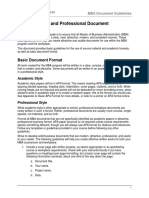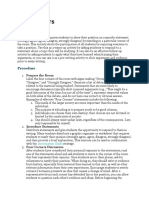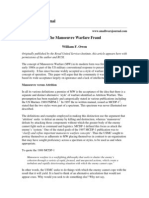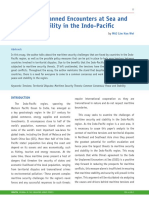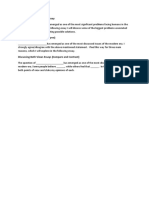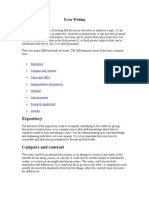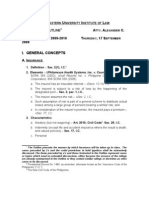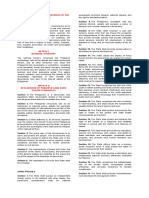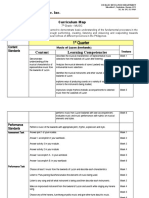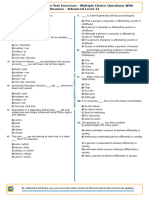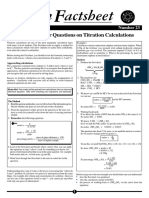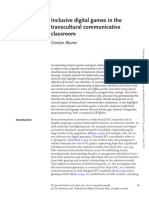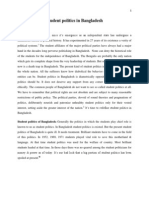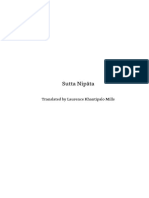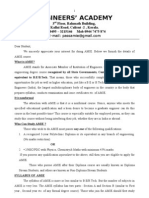The Five C's
The Five C's
Uploaded by
Raphy AlvarezCopyright:
Available Formats
The Five C's
The Five C's
Uploaded by
Raphy AlvarezOriginal Description:
Original Title
Copyright
Available Formats
Share this document
Did you find this document useful?
Is this content inappropriate?
Copyright:
Available Formats
The Five C's
The Five C's
Uploaded by
Raphy AlvarezCopyright:
Available Formats
Connect: Topic Chains Your readers will find it easier to follow writing in which the topics of the sentences
remain relatively consistent and linked together in a chain. Examine your writing for unexpected topic switches. Although sentences with active voice verbs are generally preferred to those with passive voice, the passive voice is used to good effect to avoid a topic switch.
Draft I have lived all my life in Brooklyn, New York. Park Slope is a neighborhood that has many different ethnic cultures. Harmony exists among the people, even though it does not in many other Brooklyn neighborhoods. Many articles in the press have praised the Slope for its ethnic variety. Many different ethnic cultures flourish in Park Slope, Brooklyn, where I have lived all my life. These different cultures live together harmoniously, even though they do not in many otherBrooklyn neighborhoods. In fact, the ethnic harmony of the Slope has often been praised in the press.
paragraph was on the topic of retirement, and these first two sentences of the next paragraph provide the link between saving for retirement and saving for pleasure. Use adjectives like this and these to provide a link: These proposals will help. However, . . . Use transitions such as also, too, in addition, however, therefore, and as a result to signal the logical connection between ideas.
Commit: Critical Thinking Critical thinking does not mean criticizing negatively. It means examining and analyzing information with an open mind. Whether you are writing a business analysis, an essay about literature, or a persuasive argument, committing to critical thinking is a necessary first step. Develop a system of inquiry. (Just because something is in print, it is not necessarily accurate or applicable at all times.) Having a system of inquiry will lead to using certain stylistic features in your writing: questions, reflective statements about the position of authors you read, and statements that point out an alternative view (introduced with phrases such as but, however, on the other hand, and this also indicates that . . .). When you think critically, your writing takes on your own voice, you own stance. It becomes more engaged and vital, a reflection of your thinking rather than a regurgitation of others' opinions. Following are suggestions to help you develop critical thinking skills and write in a way that involves critical analysis. Write journals. When you read or research an issue, keep a journal of your responses to what you read. Here, in your own ungraded writing, you can write summaries, make inferences, ask questions, challenge views, reflect on the opinions of others, and identify and consider the author's purpose. Observe details. In your journal writing, letters, conversations, and papers, develop your skill in observing and remembering details: the
Revised
Connect: Paragraph Links Just as readers appreciate a smooth flow of information from one sentence to another, they also expect to find transitions ("bridges," or connections) between paragraphs. A new paragraph does signal a shift to a new topic, but not necessarily to one that is completely different. Lead your readers over steppingstones; don't ask them to leap over chasms. Tips for providing paragraph links.
Read your draft aloud. As you finish a paragraph, make a note of what point you made in the paragraph. Then, at the end, read your notes and check your flow and logic. Refer to the main idea of the previous paragraph as you begin the next: Retirement is not the only reason for saving. Saving also provides a nest egg for the unexpected and the pleasurable. The previous
names of characters in a novel, the clothes worn in a film, the author of a magazine article, the main points in a lecture, the appearance of everyday objects, and so on. Ask questions. In spoken discussion, in the margins of books or articles, or in your journal, ask questions. Interact with ideas. Become involved with your own education. As or after you read an article or listen to a lecture, write questions that you would like answered, questions relating to the specific content of what you read or hear. More generally, when confronting information that you read or hear, ask:
Analyze and evaluate arguments. Analyze how writers are presenting information. If they classify information, do the categories cover all the material? If they compare and contrast, is this approach valid and helpful? If they speculate about cause and effect, have they done a thorough job? Similarly, when you write, consider how you present information. To think and write critically, you also need to evaluate other writers' logic, watch for flaws in your own logic, and construct your arguments with care. Commit: Point of View Your background reading, critical thinking, and drafting will help you discover a perspective and thesis that seem correct to you. Once you have made those decisions, use language that shows commitment to the point of view you develop through your critical thinking. When you are trying to persuade your readers to accept your point of view, avoid the language of ambivalence and indecisiveness evident in words and phrases like maybe, perhaps, might, it could be, it could happen, it might seem, and it would appear. Aim for language that reflects accountability and commitment: as a result, consequently, of course, believe, need, demand, think, should, must. Use language of commitment, however, only after you have thoroughly researched your topic and found the evidence convincing. Commit: Confident Stance Convey to your readers an attitude of confidence in your abilities and judgment. Readers will not be impressed by apologies. One student writer ended an essay like this:
Draft I hope I have conveyed to my reader something about our cultural differences. I would like my reader to note that this is just my view, even if a unique one. Room for errors and prejudices should be provided. The lack of a
What do I need to know to understand this information fully? Where does this information come from? What are the author's purpose and bias? What evidence is provided? Do I find that evidence convincing? How does this information fit with what I already know? What else do I need to ask?
Look for assumptions and bias. Writers often work to establish common ground with their readers. When you read, try to determine what that common ground is. What audience is the writer writing for? Is the writer presenting facts or opinions? What does the writer assume that the reader already knows and believes? Do you accept the writer's assumptions? Understand other viewpoints and consider alternatives. If you read an argument that you disagree with, do not just reject it or write it off as ridiculous. Try to understand why the writer holds the opinion, what the writer's background is, and what audience the writer is writing for. Are there instances in which you would agree with the author's views? Such reflections can lead to concessive statements (those that yield to, grant, or acknowledge an opposing position) in your writing, such as "The author explains why he holds this view, and he does so convincingly for the small segment of the population he addresses. However, . . . ."
total overview, which would take more time and expertise, should also be taken into account.
If you really have not had time to do an adequate job of making and supporting a point, try to find extra time and improve the draft. Don't be content with adding apologetic notes admitting that you don't know much about your topic. Here is the same student's revised ending:
Revised The stories I have told and the examples I have given come from my own experience, but they illustrate clearly the idea that in one place and at one time, cultural differences did not have to separate people but could be a way of bringing them closer together. A diverse, multilingual society holds many potential benefits for all its members.
Even if you know you have done a thorough job of presenting your opinion and marshaling evidence to support it, you may feel that other writers have covered the topic more extensively. There is no need to measure your contribution against theirs. Just submit your paper confidently, secure in the knowledge that the argument in it is well supported.
You might also like
- BLUF Writing FormatDocument9 pagesBLUF Writing FormatSveto Cvetkovski100% (1)
- MBA Academic Professional Document GuidelinesDocument10 pagesMBA Academic Professional Document GuidelineszeeshanNo ratings yet
- The Level-of-Analysis Problem in International Relations (1961)Document17 pagesThe Level-of-Analysis Problem in International Relations (1961)Temporary AccountNo ratings yet
- The Impact of The Financial Crisis On European DefenceDocument72 pagesThe Impact of The Financial Crisis On European DefenceAnonymous tSYkkHToBP0% (1)
- The Flinch by Julien Smith PDFDocument1 pageThe Flinch by Julien Smith PDFArun KNNo ratings yet
- Reported Speech: Intermediate LevelDocument14 pagesReported Speech: Intermediate Levelmawatataru100% (1)
- Synthesis Outline + Essay TemplateDocument7 pagesSynthesis Outline + Essay TemplatefirdausNo ratings yet
- Arguing & Discussing: LanguageDocument4 pagesArguing & Discussing: LanguagegetxotarraNo ratings yet
- Writingsupportsample2 Constructedresponsequestion RaceDocument2 pagesWritingsupportsample2 Constructedresponsequestion Raceapi-345242472No ratings yet
- CER Drafting ToolDocument1 pageCER Drafting ToolAndrás LeventeNo ratings yet
- Table Talk StrategyDocument3 pagesTable Talk Strategyapi-248208787No ratings yet
- Homework Recording SheetsDocument2 pagesHomework Recording SheetsMissCotonNo ratings yet
- Definition of An ArgumentDocument6 pagesDefinition of An ArgumentSaira RandhawaNo ratings yet
- Index of Templates From They Say - How To Add QuotesDocument8 pagesIndex of Templates From They Say - How To Add QuotesQazi Ammar AlamNo ratings yet
- Teaching StrategiesDocument3 pagesTeaching StrategiesDominique Lim YañezNo ratings yet
- Small Wars Journal: William F. OwenDocument9 pagesSmall Wars Journal: William F. OwendavidpradagarciaNo ratings yet
- Cornell Notes. Argument Essay OutlineDocument3 pagesCornell Notes. Argument Essay OutlineMrsBrooks1No ratings yet
- LEARNING PACKAGE WEEK NUMBER 12 - November 9-14, 2020 Title: Resolving ConflictDocument7 pagesLEARNING PACKAGE WEEK NUMBER 12 - November 9-14, 2020 Title: Resolving ConflictIAN MANUEL POLONo ratings yet
- Sample English ExamDocument10 pagesSample English ExamVillapandoNo ratings yet
- How To Write A Good Paper in Political ScienceDocument4 pagesHow To Write A Good Paper in Political SciencenadiaNo ratings yet
- 11 Lessons of WarDocument13 pages11 Lessons of WarMafalda Ferreira de AlmeidaNo ratings yet
- Informal Narrative Letter UpdateDocument2 pagesInformal Narrative Letter UpdateMercedes SANo ratings yet
- Navy Tradeoff DADocument22 pagesNavy Tradeoff DAJosh EversNo ratings yet
- SHS Rubric-9th.10th.-CCSS-W-1-9.20122-8 14 2016Document2 pagesSHS Rubric-9th.10th.-CCSS-W-1-9.20122-8 14 2016Korey BradleyNo ratings yet
- Sale of Human Organs Should Be Legalized: All The PointsDocument7 pagesSale of Human Organs Should Be Legalized: All The PointsJamaica caindecNo ratings yet
- BA Defence and Strategic Studies 1Document60 pagesBA Defence and Strategic Studies 1Carol infantNo ratings yet
- Buku Sea Power and Strategy in The Indian Ocean HALAMAN 25-28Document23 pagesBuku Sea Power and Strategy in The Indian Ocean HALAMAN 25-28Ari NugrohoNo ratings yet
- Code For Unplanned Encounters at Sea and Maritime Stability in The Indo-PacificDocument13 pagesCode For Unplanned Encounters at Sea and Maritime Stability in The Indo-Pacific王大明No ratings yet
- The Solution and Problem EssayDocument1 pageThe Solution and Problem EssayYogesh ParmarNo ratings yet
- Writing Ex 1Document10 pagesWriting Ex 1Sule IyibilirNo ratings yet
- Uncertainty and Reassurance in International PoliticsDocument9 pagesUncertainty and Reassurance in International PoliticsLauraPimentelNo ratings yet
- Debatabase PDFDocument220 pagesDebatabase PDFafp143No ratings yet
- English 110 Argumentation Terms HandoutDocument11 pagesEnglish 110 Argumentation Terms HandoutKVCCWCNo ratings yet
- P2 B2 W6 How To Write An EssayDocument9 pagesP2 B2 W6 How To Write An Essayahmet akinNo ratings yet
- Jervis, R. (1988) - Realism, Game Theory, and CooperationDocument34 pagesJervis, R. (1988) - Realism, Game Theory, and CooperationFranco VilellaNo ratings yet
- U.S. Missile Defense and European SecurityDocument10 pagesU.S. Missile Defense and European SecurityThe American Security ProjectNo ratings yet
- Nazi PropagandaDocument9 pagesNazi PropagandaIsaiah S.No ratings yet
- Indirect ApproachDocument2 pagesIndirect ApproachschorleworleNo ratings yet
- Toulmin ArgumentDocument3 pagesToulmin ArgumentKhôiNo ratings yet
- Context Clues Vocabulary Builder PDFDocument1 pageContext Clues Vocabulary Builder PDFHeba OthmanNo ratings yet
- Student BookletDocument6 pagesStudent BookletMissCotonNo ratings yet
- A - Academic DebateDocument4 pagesA - Academic DebateGhazi Bahroz JumaaNo ratings yet
- International Law & OrganizationsDocument11 pagesInternational Law & OrganizationsAsmat AliNo ratings yet
- 560 JervisperceptionandmisperceptionDocument5 pages560 JervisperceptionandmisperceptionDuyLy ChuNo ratings yet
- Formal and Informal Language (APTIS)Document5 pagesFormal and Informal Language (APTIS)Anonymous AlNYJDV100% (1)
- Leeds Debating Union Guide BookletDocument24 pagesLeeds Debating Union Guide Bookletmjburgess100% (1)
- Strategy A Short Guide (23p) Martin Van CreveldDocument23 pagesStrategy A Short Guide (23p) Martin Van CreveldMichal wojcikNo ratings yet
- Debate Cue Cards TemplateDocument2 pagesDebate Cue Cards Templatearfa_syahrulfath0% (1)
- How To Write An Argumentative Essay in 9 Easy StepsDocument3 pagesHow To Write An Argumentative Essay in 9 Easy StepsMohammed AlhashdiNo ratings yet
- Practical Argumentation by Pattee, George K.Document155 pagesPractical Argumentation by Pattee, George K.Gutenberg.orgNo ratings yet
- Grand StrategyDocument3 pagesGrand StrategykaranreguNo ratings yet
- First Principles of Intelligence AnalysisDocument17 pagesFirst Principles of Intelligence AnalysisArgento Roser100% (1)
- Cause and EffectDocument16 pagesCause and EffectKevvy Ed MuellerNo ratings yet
- Practical Tips in Writing Thesis or DissertationDocument8 pagesPractical Tips in Writing Thesis or DissertationMa'am KC Lat Perez100% (1)
- Reluctant Crusaders: Power, Culture, and Change in American Grand StrategyFrom EverandReluctant Crusaders: Power, Culture, and Change in American Grand StrategyNo ratings yet
- Critical Reading and AnnotationDocument3 pagesCritical Reading and AnnotationBen SmirNo ratings yet
- Expository: Essay WritingDocument5 pagesExpository: Essay WritingstavrosthalisNo ratings yet
- Progresion Iii-VisualrhetoricDocument4 pagesProgresion Iii-Visualrhetoricapi-302047757No ratings yet
- Plagiarism: Why Are My Instructors So Concerned About Plagiarism?Document10 pagesPlagiarism: Why Are My Instructors So Concerned About Plagiarism?Subhash DhungelNo ratings yet
- Six Reading Habits To Develop in Your First Year at HarvardDocument2 pagesSix Reading Habits To Develop in Your First Year at HarvardLamont Research Services, Harvard UNo ratings yet
- Temporary Arrangement STREET: - # PS Route To Day To Sequence To RemarksDocument1 pageTemporary Arrangement STREET: - # PS Route To Day To Sequence To RemarksRaphy AlvarezNo ratings yet
- And, But, Or, Nor, So, For, Yet.: CommasDocument3 pagesAnd, But, Or, Nor, So, For, Yet.: CommasRaphy AlvarezNo ratings yet
- Capital Letter Ethan Frome:, My Best Friend, Their Apartment, New Car, The BookDocument3 pagesCapital Letter Ethan Frome:, My Best Friend, Their Apartment, New Car, The BookRaphy AlvarezNo ratings yet
- Phil Intl Shipping Corp v. NLRCDocument2 pagesPhil Intl Shipping Corp v. NLRCRaphy AlvarezNo ratings yet
- Insurance O: F E U I LDocument22 pagesInsurance O: F E U I LRaphy AlvarezNo ratings yet
- Sermon Addressing: Contribute MoneyDocument3 pagesSermon Addressing: Contribute MoneyRaphy AlvarezNo ratings yet
- Sentence SnarlsDocument4 pagesSentence SnarlsRaphy Alvarez100% (1)
- Adverbs and AdjectivesDocument6 pagesAdverbs and AdjectivesRaphy AlvarezNo ratings yet
- MP Program TemplateDocument2 pagesMP Program TemplateRaphy AlvarezNo ratings yet
- TypeDocument3 pagesTypeRaphy AlvarezNo ratings yet
- Totally Accessible and Very Prime Location!!!: So Why Rent If You Can OWN???Document2 pagesTotally Accessible and Very Prime Location!!!: So Why Rent If You Can OWN???Raphy AlvarezNo ratings yet
- 1987 Philippine Constitution.Document27 pages1987 Philippine Constitution.Raphy AlvarezNo ratings yet
- Patrick NathanDocument22 pagesPatrick NathanRaphy AlvarezNo ratings yet
- Fernando Collantes VDocument1 pageFernando Collantes VRaphy AlvarezNo ratings yet
- Learning by Ear Jobs Education Radio Drama 04 ScriptDocument9 pagesLearning by Ear Jobs Education Radio Drama 04 ScriptShanice ThompsonNo ratings yet
- Kumaran Rajaram - Leading and Transforming Organizations - Navigating The Future (2023, Routledge)Document211 pagesKumaran Rajaram - Leading and Transforming Organizations - Navigating The Future (2023, Routledge)naninibg100% (1)
- Interpretation, Vol 35-1Document104 pagesInterpretation, Vol 35-1platonkaihoagathonNo ratings yet
- Detailed Lesson PlanDocument9 pagesDetailed Lesson PlanbjkaunlaranbambangbranchNo ratings yet
- DLL Math Grade8 Quarter1 Week1 (Palawan Division)Document8 pagesDLL Math Grade8 Quarter1 Week1 (Palawan Division)Ami RANo ratings yet
- Education 12 00443 v3Document18 pagesEducation 12 00443 v3DIANA HEREDIA BALLADARESNo ratings yet
- 7 Music Curriculum Map Maam AingelDocument12 pages7 Music Curriculum Map Maam AingelLavander BlushNo ratings yet
- 511 Sentence Completion Test Exercises Multiple Choice Questions With Answers Advanced Level 12Document5 pages511 Sentence Completion Test Exercises Multiple Choice Questions With Answers Advanced Level 12rebeca carlileNo ratings yet
- Grade 7 Standard Indicators: Legend: F (Strand) (Standard) G7/ (Indicator)Document1 pageGrade 7 Standard Indicators: Legend: F (Strand) (Standard) G7/ (Indicator)JC SantosNo ratings yet
- First-Year Students AI-competence As A Predictor For Intended and de Facto Use of AI-tools For Supporting Learning Processes in Higher EducationDocument13 pagesFirst-Year Students AI-competence As A Predictor For Intended and de Facto Use of AI-tools For Supporting Learning Processes in Higher EducationYASSER HIPOLITO YARIN ACHACHAGUANo ratings yet
- My Old CVDocument3 pagesMy Old CVFeda MohammadiNo ratings yet
- 23titra PDFDocument2 pages23titra PDFThuvarakaNo ratings yet
- Ccaa 084Document12 pagesCcaa 084Angie VerdúNo ratings yet
- Modul Ajar Bahasa Inggris Fase D Kelas 8 Chapter 1Document14 pagesModul Ajar Bahasa Inggris Fase D Kelas 8 Chapter 1Bang MoNo ratings yet
- Afro Peruvian Drumset TeseDocument199 pagesAfro Peruvian Drumset Tesealexandre biondi100% (3)
- Example CV Template FoundationDocument3 pagesExample CV Template Foundationdazdaook daodaNo ratings yet
- Cover Letter Format For TeacherDocument9 pagesCover Letter Format For Teacherf60pk9dc100% (2)
- Kosiba Becoming InkaDocument399 pagesKosiba Becoming InkaToni ClarkNo ratings yet
- Student Politics in BangladeshDocument8 pagesStudent Politics in BangladeshTohura Moriom Misti100% (4)
- Older People Friendly SA Guide-2Document33 pagesOlder People Friendly SA Guide-2abat ayilfNo ratings yet
- Fine Motor Impact On Prewriting DevelopmentDocument31 pagesFine Motor Impact On Prewriting DevelopmentKaren ClarkNo ratings yet
- GNIOT Fee Structure 2023Document2 pagesGNIOT Fee Structure 2023Manav PuriNo ratings yet
- Sutta NipataDocument355 pagesSutta NipataMatt Aldridge100% (1)
- AmieDocument17 pagesAmielazeez.co.in86% (7)
- Objectives and AssessmentDocument4 pagesObjectives and Assessmentapi-325943973No ratings yet
- Performance Task in Research Iv: Parents SignatureDocument3 pagesPerformance Task in Research Iv: Parents SignatureAzeah Levesque100% (2)
- Education in Canada: A World of Possibilities AwaitsDocument5 pagesEducation in Canada: A World of Possibilities AwaitsFirli LissajidinNo ratings yet
- Chapter 1 5Document43 pagesChapter 1 5Mayie Sinilong100% (2)
- Movement Patterns: Quarter 1 - Module 1Document16 pagesMovement Patterns: Quarter 1 - Module 1Christy Joy AyubanNo ratings yet

